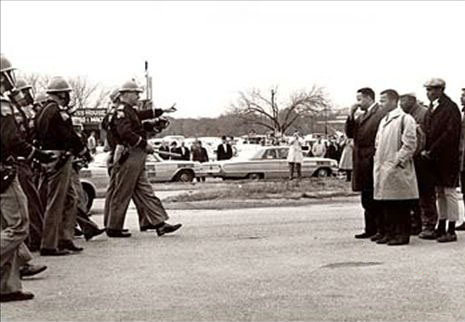Representative John Lewis Speaks with High School Students: 'Good Trouble' in Georgia's Fifth District
Confrontation at the Edmund Pettus Bridge, Selma, 7 March 1965. John Lewis on the right in a white coat/PRIO.org/Spider Martin, Birmingham News, Two Minute Warning
As part of a C-SPAN and Comcast project in 2003 to encourage dialogue between students and national leaders, Representative John Lewis (D-GA) spoke to high school students about the value of public service, his life and career, and his experiences in the Civil Rights Movement. Following his remarks he answered questions from the students.
"When you look back, the year that Barack Obama was born 50 years ago, black people and white people in the American South couldn't sit together on a bus or on a train or in a waiting room. And we changed that." NPR
“Speak up, speak out, get in the way,” said Lewis, who appeared frail but spoke in a strong voice. “Get in good trouble, necessary trouble, and help redeem the soul of America.”
Often called "one of the most courageous persons the Civil Rights Movement ever produced," John Lewis has dedicated his life to protecting human rights, securing civil liberties, and building what he calls "The Beloved Community” in America. His dedication to the highest ethical standards and moral principles has won him the admiration of many of his colleagues on both sides of the aisle in the United States Congress.
He has been called "the conscience of the U.S. Congress,” and Roll Call magazine has said, "John Lewis…is a genuine American hero and moral leader who commands widespread respect in the chamber.”
He was born the son of sharecroppers on February 21, 1940, outside of Troy, Alabama. He grew up on his family's farm and attended segregated public schools in Pike County, Alabama. As a young boy, he was inspired by the activism surrounding the Montgomery Bus Boycott and the words of the Rev. Martin Luther King Jr., which he heard on radio broadcasts. In those pivotal moments, he made a decision to become a part of the Civil Rights Movement. Ever since then, he has remained at the vanguard of progressive social movements and the human rights struggle in the United States.
As a student at Fisk University, John Lewis organized sit-in demonstrations at segregated lunch counters in Nashville, Tennessee. In 1961, he volunteered to participate in the Freedom Rides, which challenged segregation at interstate bus terminals across the South. Lewis risked his life on those Rides many times by simply sitting in seats reserved for white patrons. He was also beaten severely by angry mobs and arrested by police for challenging the injustice of Jim Crow segregation in the South.







